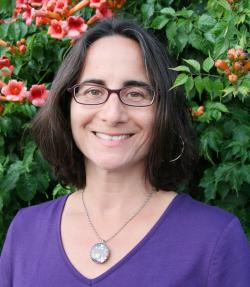
Madeleine Charney is a research services librarian with the UMass Libraries. She specializes in topics close to the heart of anyone interested in agriculture, food or the environment. Charney has seen an evolution of her tasks from the love of books, when she steered students toward library stacks, to managing data and offering information on open access. Her days are full as she works at the intersection of library services and the built/natural environment. Charney is an academic liaison to the departments of Architecture, Landscape Architecture, Regional Planning and programs for Sustainable Food & Farming, Building & Construction Technology and Arboriculture & Community Forest Management.
Charney grew up on Long Island in a family very involved with actions to protect the environment and the earth. They installed solar panels on their home in the early 1970’s and established a compost bin long before it was mainstream. They also highly valued education. The joke at their dining room table was that any time a question arose, someone dashed to their Encyclopedia Britannica to serve up the answers. Both of her parents were public school teachers and her father taught earth science (and actually sold some of those encyclopedias to supplement their income). Along the way, Madeleine became a lifelong learner formed by the desire to care for the earth. She says, “This is what it’s all about for me.”
She majored in English in college, but was unsure if teaching was the path she wanted to pursue. Given that her formative years were rooted in finding answers within a green household, when her mother suggested she consider librarianship, Charney said it was a thunderbolt epiphany. It felt completely right and she never looked back.
Her life after college and prior to UMass employment further shaped her understanding of and affinity for issues around sustainability. After earning her masters of library science from the University of Rhode Island in 1991, she worked for 10 years in community college libraries. Seeking a break from academia and a work-a-day life, she was accepted into the Green Apprentice program at Kibbutz Lotan, an ecological community in southern Israel where she immersed in hands-on organic farming, eco-building projects and permaculture values. Returning to the U.S., she completed a masters degree in sustainable landscape planning and design at the Conway School of Landscape Design, soon after becoming solo librarian at the New England Small Farm Institute in Belchertown. Well-grounded in landscape architecture and sustainability issues, she accepted a job with the UMass Libraries in 2004.
At UMass, Charney serves as Chair of the Advisory Board for the environmental humanities publication Paperbark, is co-founder of the Sustainability Curriculum Fellowship Program and an active member of the Chancellor's Sustainability Advisory Committee. In the library profession, Charney is co-founder of the Sustainability Round Table: Libraries Fostering Resilient Communities. She is also a Master Gardener with a Permaculture Design Certificate.
Once the pandemic began, Charney’s role developed another dimension. She provides emotional support for faculty and students doing research, which is especially difficult since many people are performing jobs and studying off-campus. Charney works with students online, many of whom feel lost in accessing information and finding a clear path toward answers. She said, “Research is messy, but never more so than in a pandemic.” One way she describes this development is that she has been able to act as a sounding board or a ‘thinking partner.’ Charney enjoys the process of how people’s ideas evolve, and aims to listen deeply and reflect back what she hears. She calls it motivational interviewing and it helps someone understand themselves. While she does not have a background in psychology, her intuitive sense and life experience allow her to reach out and direct people to a range of resources both informational and human. Charney receives requests for information and support from across the world and, working for a public institution, does not turn anyone away. The sense one gets of her work as a librarian is that she goes above and beyond to help faculty, students community members and becomes a partner in their learning quest.
Another aspect of Charney’s position is helping manage the Libraries Sustainability Fund. UMass community members may request funds to co-sponsor a program or apply for a small grant. For example, this year a student organized a 10-week discussion based on Braiding Sweetgrass by Robin Wall Kimmerer. The Fund paid for 20 copies of the book for students and gave the student leader a small stipend in appreciation for his self-motivated effort. For information about the Fund or to make a request, contact Madeleine directly at mcharney@library.umass.edu.